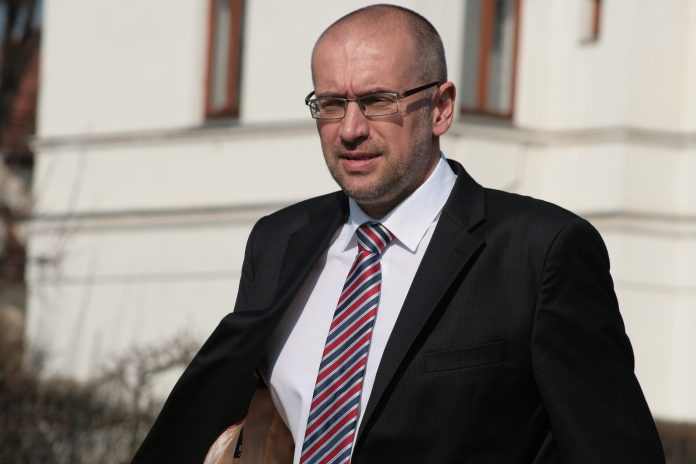At the meeting of the European Economic and Social Committee’s Bureau in Prague (EESC), the Czech Minister for European Affairs, Mikuláš Bek, presented the priorities of the forthcoming Czech EU presidency. The minister also joined EESC members in a seminar on sustainable and affordable energy for the EU.
The European Union needs secure energy supplies. This was the message of Czech Minister for European Affairs, Mikuláš Bek, as he addressed the EESC members at the Bureau meeting held in Prague on 28 April 2022.
Referring to the developments in the crisis in Ukraine, he said that “ensuring access to affordable, sustainable but also reliable energy sources will be one of the biggest challenges which the EU has ever faced”.
Mr Bek revealed the five probable political priorities of the upcoming Czech presidency of the Council of the European Union, stressing that the spotlight would be on the green and digital transition but also – in the light of recent events – on security.
The upcoming Czech EU presidency – influenced by the Ukraine war
Under the motto “Europe as a task”, according to a speech by Czech writer and head of state Václav Havel in Aachen, the Czech EU presidency will focus on:
1) managing the refugee crisis and post-recovery in Ukraine – adopting an approach combining economic assistance and structural reforms in Ukraine and supporting a standard procedure of candidacy to the EU;
2) energy security in Europe – working for a mechanism that guarantees a fair share of energy sources between EU Member States and to intensify investment in renewables;
3) reinforcement of European defence capacity and cyberspace security – EU and NATO must be complementary;
4) strategic resilience of the European economy – strengthening innovation and competiveness and reducing dependence from hostile regimes;
5) resilience of democratic institutions – focussing on media freedom, on transparency in financing political parties in the EU and on the rule of law.
In the debate, the EESC members urged the minister to increase the EU’s and national governments’ support to civil society organisations. Civil society organisations were right on the frontline in the humanitarian crisis brought about by the Russian invasion of Ukraine and they needed urgent and concrete support.
European solidarity was another key thread in the discussion. It would only be possible to stop energy imports from Russia if all EU Member States stuck together and shared available energy sources.
Several speakers also warned against disregarding social aspects during the Czech Council Presidency in the second half of 2022. With energy and food prices increasing, poverty was on the rise and was threatening social cohesion.
EESC members also called for initiatives to support innovation, which is key to develop businesses and strengthen the economy, stressing in particular the need to invest in renewable energies.
The right mix of sustainable and affordable energy for the EU’s future
In the seminar on an Optimal energy mix for sustainable and affordable energy, which took place in the afternoon, prominent speakers assessed the potential of different energy sources to meet the EU’s 2050 climate goals.
EESC president Christa Schweng pointed out that reducing the EU’s energy dependency from third countries was essential. The way ahead was to diversify energy sources and step up investment on renewables.
“Due to the war in Ukraine, the case for a rapid clean energy transition, reducing the EU’s energy dependency on third parties and diversifying our energy sources with greater use of local and renewable energy sources, has never been stronger and clearer,” she said.
“Key to the success will be: decentralised access to energy, better interconnection, targeted local measures and financial incentives, and the reduction of administrative burden. To ensure a successful transition, civil society organisations must play a key role in defining and implementing policies,” she added.
René Neděla, Czech Deputy Minister of Industry and Trade, stressed that the energy security pillar must be accompanied by the pillar of environmental sustainability and affordability.
Solidarity among EU Member States in accessing energy sources was the key message of Vladimír Špidla, former Commissioner responsible for Employment, Social Affairs and Equal Opportunities.
For his part, Petr Zahradnik from the Czech Ministry for European Affairs emphasised the important role that energy communities could play locally in the future.

